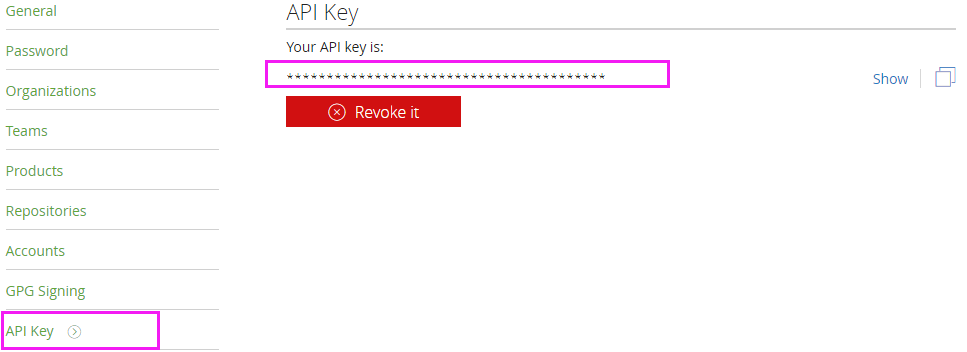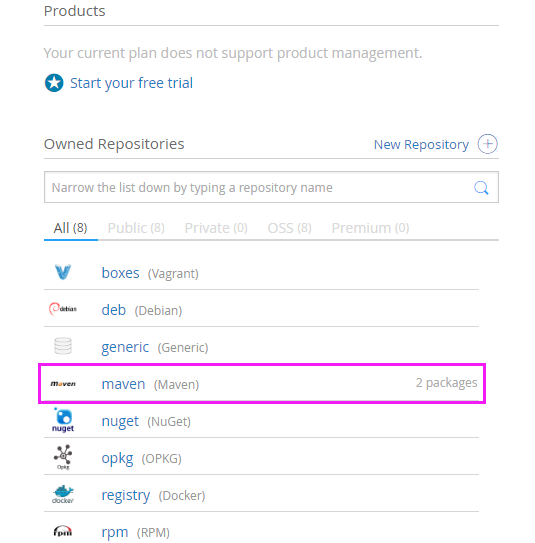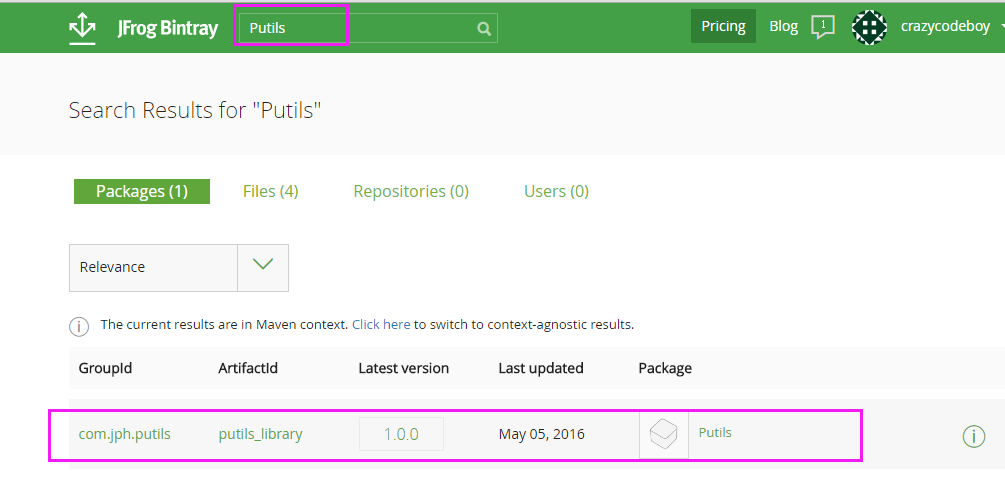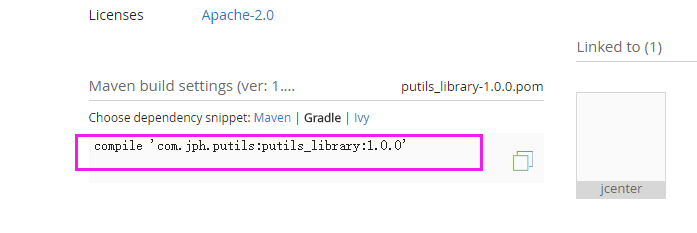JCenter是全世界最大的Java仓库,也是Android Studio中repositories的默认节点。JCenter支持Maven, Gradle, Ivy, SBT 等大部分构建工具。将项目发布到JCenter大致流程如下:
具体步骤:
第一步:注册Bintray拿到API Key
如果你已经有账号,则可以跳过这一步,直接往下看。
JCenter是由Bintray公司在维护,因此你必须注册一个Bintray账号,注册完账号后Bintray会分配给你一个API Key。
登陆后在首页右上角点击用户名选项下的”Your Profile”进入个人主页,然后点击用户名下面的Edit进入个人信息编辑页面,接下来点击页面左边列表的最后一项API Key。
第二步:发布前的配置
首先:添加maven-gradle、gradle-bintray插件
在项目的最外层的build.gradle文件中的dependencies节点下添加:
classpath 'com.github.dcendents:android-maven-gradle-plugin:1.3'
classpath 'com.jfrog.bintray.gradle:gradle-bintray-plugin:1.6'android-maven-gradle-plugin插件是用来打包Maven所需文件的。
gradle-bintray-plugin插件是用来将生成的Maven所需文件上传到Bintray的。
// Top-level build file where you can add configuration options common to all sub-projects/modules.
buildscript {
repositories {
jcenter()
}
dependencies {
classpath 'com.android.tools.build:gradle:2.0.0'
classpath 'com.github.dcendents:android-maven-gradle-plugin:1.3'
classpath 'com.jfrog.bintray.gradle:gradle-bintray-plugin:1.6'
// NOTE: Do not place your application dependencies here; they belong
// in the individual module build.gradle files
}
}
allprojects {
repositories {
jcenter()
}
}
task clean(type: Delete) {
delete rootProject.buildDir
} 其次,在library model下的build.gradle中进行相应配置
apply plugin: 'com.github.dcendents.android-maven'
apply plugin: 'com.jfrog.bintray'
// This is the library version used when deploying the artifact
version = "1.0.0"
def siteUrl = 'https://git.oschina.net/crazycodeboy/ScanProj' // 项目的主页
def gitUrl = 'https://git.oschina.net/crazycodeboy/ScanProj.git' // Git仓库的url
group = "com.jph.scan.zxing" // Maven Group ID for the artifact,一般填你唯一的包名
install {
repositories.mavenInstaller {
// This generates POM.xml with proper parameters
pom {
project {
packaging 'aar'
// Add your description here
name 'multi-format 1D/2D barcode image processing use zxing.'
url siteUrl
// Set your license
licenses {
license {
name 'The Apache Software License, Version 2.0'
url 'http://www.apache.org/licenses/LICENSE-2.0.txt'
}
}
developers {
developer {
id 'you id' //填写的一些基本信息
name 'your name'
email 'your email'
}
}
scm {
connection gitUrl
developerConnection gitUrl
url siteUrl
}
}
}
}
}
task sourcesJar(type: Jar) {
from android.sourceSets.main.java.srcDirs
classifier = 'sources'
}
task javadoc(type: Javadoc) {
source = android.sourceSets.main.java.srcDirs
classpath += project.files(android.getBootClasspath().join(File.pathSeparator))
}
task javadocJar(type: Jar, dependsOn: javadoc) {
classifier = 'javadoc'
from javadoc.destinationDir
}
artifacts {
archives javadocJar
archives sourcesJar
}
Properties properties = new Properties()
properties.load(project.rootProject.file('local.properties').newDataInputStream())
bintray {
user = properties.getProperty("bintray.user")
key = properties.getProperty("bintray.apikey")
configurations = ['archives']
pkg {
repo = "maven"
name = "ScanProj" //发布到JCenter上的项目名字
websiteUrl = siteUrl
vcsUrl = gitUrl
licenses = ["Apache-2.0"]
publish = true
}
}
javadoc { //jav doc采用utf-8编码否则会报“GBK的不可映射字符”错误
options{
encoding "UTF-8"
charSet 'UTF-8'
}
}
其实这些配置脚本也可以从model的build.gradle文件中抽离出来,现在下library model下创建一个bintrayUpload.gradle文件然后将上述代码复制进去,之后再library model的build.gradle中加入如下代码:
apply from: "bintrayUpload.gradle" 最后,在local.properties文件中添加从Bintray申请到的API Key
#bintray
bintray.user=your bintray username
bintray.apikey=your apikey建议将local.properties文件加入忽略文件中不上传,以保护你的apikey
第三步:将项目提交到Bintray
如果你一完成了上述的配置后,下面只需要一行代码就可以完成将项目提交到Bintray。
打开终端进入项目目录下,执行gradlew bintrayUpload命令即可。
执行完成后,打开你的bintray主页如果在”Owned Repositories”下的maven选中看到你的仓库,则说明你已经将你的仓库成功上传到bintray了。
如图:
第四步:将提交到Bintray的项目发布到JCenter
完成上述的步骤只是将项目提交到bintray,还无法使用该项目库,因为还没有发布到JCenter。
登入Bintray网站,进入个人中心,在右侧的Owned Repositories区域点击Maven的图标,进入你的Maven项目列表。
如果已经上传成功了,在这里就能看到你的项目,进入项目详情,在右下角的Linked To区域点击Add to JCenter,然后在Comments输入框里随便填写下信息,最后点Send提交请求即可。一般情况下当天就会审核,审核通过后会给你发邮件通知你,并且以后更新项目就不需要再审核了。
审核成功后就可以使用你发布到JCenter上的项目了。
使用你发布到JCenter上的项目
在Bintray的搜索输入框中输入你的项目:
如图:
单击搜索结果中你的项目,进入项目预览便可以看到项目的引用方式:
如图:































 483
483

 被折叠的 条评论
为什么被折叠?
被折叠的 条评论
为什么被折叠?








